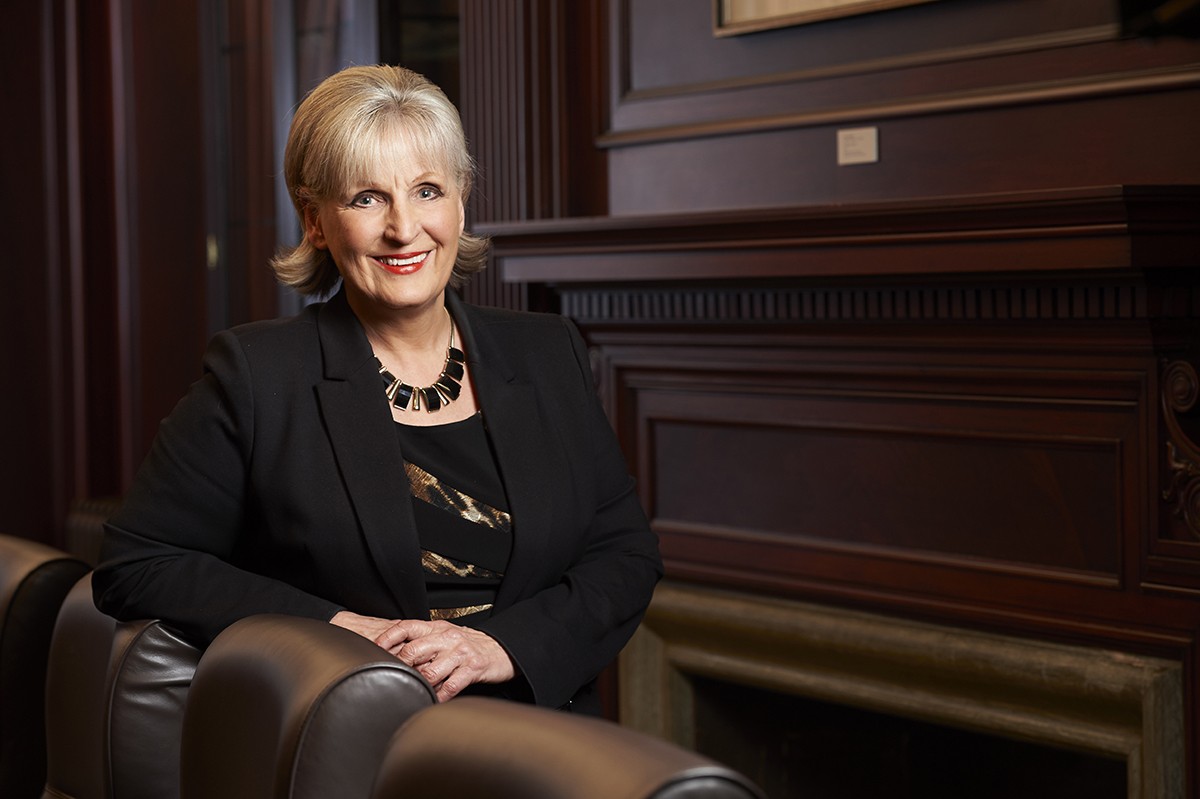
Debra Jonasson-Young, Director, James W. Burns Executive Education Centre
Bridging the Leadership Gap
Asper Exec Ed programs are helping managers “level up” their knowledge and skills in critical areas
Business is booming at the James W. Burns Executive Education Centre in downtown Winnipeg.
Home to the Asper School of Business’s Executive Education programs, the Centre used to offer a modest handful of sessions per year, drawing an average of five to eight attendees per session—from mid-level managers to senior executives looking to sharpen their knowledge or add a new skill to their leadership toolbox.
Since 2016, though, the Centre’s offerings have doubled and attendance has skyrocketed, says Director Debra Jonasson-Young—all thanks to savvy marketing, positive word of mouth, and programs tailor-made to businesses and industries keen to grow their dwindling leadership capacity.
“The word is out”
A veteran of leadership roles at People First HR Services, Dufresne Furniture & Appliances and Shoppers Optical, Jonasson-Young has been working hard to grow the Centre’s profile since taking the helm two and a half years ago. Since then, revenues and profits have climbed year over year.
“The word is definitely getting out about the quality of the experience we offer,” she says. “Asper Exec Ed’s emphasis on applied learning arms the management professionals in its classrooms with knowledge and skills they can put to work the moment they return to the office. We hear it again and again.”
But program quality is only one reason for the Centre’s success. More important, she says, is the relevance of the Centre’s programming to the needs of today’s businesses.
“More and more managers are coming to us with problems they need help solving, whether it’s with project management, negotiating, understanding finance, communicating more effectively, dealing with conflict. We offer great courses on all those topics.”
Often, the program brings in instructors from outside partners such as the Humphrey Group, “the very best communications people in Canada.”
But the majority of courses are taught by Asper faculty, including world-class researchers in the topics they’re instructing. “I can’t stress enough what a difference it makes to have instructors who not only know their stuff, but know how to teach adults, and how to keep managers and executives alike fully engaged in the classroom. That’s no easy feat.”
Leadership: a growing concern
One of the biggest recent growth areas for the James W. Burns Executive Education has been in coaching. “We’ve coordinated a whole suite of courses on that alone,” says Jonasson-Young, ”including a course called Certified Coach Training, which is a five-day program certified by the International Coach Federation.”
The Centre has also seen an uptick in the need for sessions on emotional intelligence training and certification.
Jonasson-Young attributes much of this demand to the leadership gap in the workplace.
“As boomers retire, organizations are bracing for a huge leadership shortage in the near future. They’re bringing in coaches to show them how to mentor people and raise their skills to the level they need to lead effectively.”
In the last few decades, many corporations flattened their organizational structures to bring senior leaders closer to the end customer, she explains.
“What you lost, if you were a junior manager, were all those learning opportunities as you climbed the ladder. When I was starting out, there was always someone a level above to guide my progress and help me gain the skills I’d need for the next level. Nowadays there’s just this empty void there, and we’re seeing people promoted to high-level positions without some of the critical leadership skills and knowledge they need to succeed in those roles. Our coaching courses are creating coaches, teaching leaders how to coach, and bridging that gap.”
Also thriving is Asper Executive Education’s capstone course, the 10-day Advanced Program in Leadership and Management, which will celebrate its five hundredth graduate this year.
“It’s a magical program,” she says, “because it’s so fluid and dynamic.” A focus on strategy forms the program’s framework; within that, modules on any topic covered in other Exec Ed courses can be arranged to suit the needs of any group. And it counts as credit towards an Asper MBA, which Jonasson-Young says has become a strong selling point.
“This year we’re seeing more large organizations testing out the Advanced Program as a precursor to working with us on custom programs we might offer in-house, or to sending more of their staff to our open enrolment courses.”
New ventures
Jonasson-Young is especially excited about new offerings coming in the next year or two, including courses on strategic pricing, scaling up your business, business ethics, cyber security risks, design thinking, process mapping, and Big Data and analytics.
“We’re hearing over and over how hungry our professional community is for knowledge in these areas.”
In 2019, Asper Executive Education will partner with the University of Alberta to offer its Municipal Leadership Training Program, a 12-day course for municipal officials, in Manitoba. “This is super-exciting. They’ve put this on for 13 years, and we’ll be the first to partner with them out of province.”
Jonasson-Young says she’s also looking forward to bringing Asper’s brand of leadership training to Manitoba’s northern communities. Along with La Royce Batchelor, director of the Stu Clark Centre for Entrepreneurship at the Asper School of Business, she has been invited to sit on a panel of Look North. The Manitoba government initiative is exploring long-term strategies to unleash the region’s economic potential.
“What an exceptional opportunity for Asper and the University of Manitoba,” she says, “to be part of something that will help build and strengthen leaders for generations to come.”
For more information about Asper Executive Education, visit their website.






